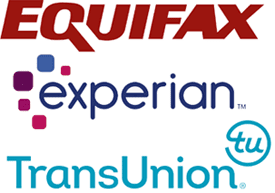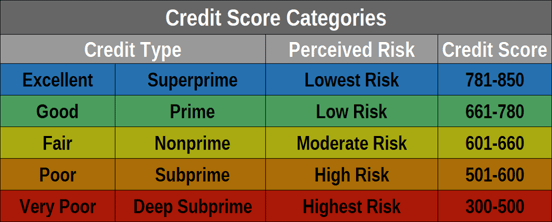

When you apply for a loan or credit card, it’s practically a given that a lender will check one of your credit reports and one of your credit scores as part of the underwriting process. Credit scores help lenders assess the risk of doing business with you and ultimately decide whether it’s a wise investment to loan you money.
As such, it’s smart to check your credit reports and scores before you apply for new financing. There is, however, a small catch.
You certainly do not have just one credit score — you have hundreds. So, which credit score will a lender check when you apply for a loan? The answer is, as it usually is when it comes to credit scoring, “it depends.”
In this case, it depends entirely on what kind of loan you’ve applied for. For our purposes today, we’re going to look at the scores used for mortgage lending.
One Mortgage Application = Either Three or Six Credit Reports and FICO Scores
If you’re like most people, a home is likely the largest purchase you will ever make. Because you’re asking to borrow such a large amount when taking out a mortgage loan, the lender will be very thorough when it reviews your creditworthiness.
 A credit card issuer or an auto lender will generally only check one of your credit reports and scores when you apply for financing. A mortgage lender, on the other hand, will review your credit information from all three of the primary credit reporting agencies: Experian, TransUnion, and Equifax.
A credit card issuer or an auto lender will generally only check one of your credit reports and scores when you apply for financing. A mortgage lender, on the other hand, will review your credit information from all three of the primary credit reporting agencies: Experian, TransUnion, and Equifax.
And, if you have a co-applicant, the lender is going to review all three of their credit reports as well.
That means one home loan application can equal as many as six credit reports and scores. In mortgage lending, because of the Federal Housing Finance Agency (FHFA) mandate, the only scores that can be used currently are three of FICO’s older scoring models, although that may eventually change.
And, in a process that only exists in mortgage lending, the lender bases its decision not on your highest credit score, not on your lowest score, but rather on the middle numeric score. If your three FICO scores were 700, 709, and 730, the lender would use the 709 as the basis for its decision.
Reviewing this large collection of credit reports and credit scores gives the mortgage lender a more comprehensive picture of your credit risk. Your three credit reports likely aren’t identical, and it’s equally unlikely your scores will be the same.

By checking all three of your reports and scores, a mortgage lender can gain a better understanding of your true level of credit risk.
Which FICO Score Generation Do Mortgage Lenders Use?
The best-known credit scores are going to fall under either the FICO or VantageScore brands. There are multiple generations of each score brand, as every few years, the score developers create newer versions. So, for example, there’s a VantageScore 1.0, 2.0, 3.0, and 4.0.
In most lending environments outside of mortgages, it’s hard to know which specific credit score a lender will use to evaluate your application. And, even if you knew your lender used a FICO Score or a VantageScore credit score, you still would not know which generation of the score it is using.
For example, you may apply for an auto loan with one lender that checks your FICO Auto Score 8 based on your Experian credit report. Yet, if you apply for financing with a different auto lender, it may opt to check your VantageScore 3.0 score based on TransUnion data.
The only way to know for sure is to ask the lender which credit report and which credit score version it plans to check, but that isn’t a guarantee that they’ll tell you.
The mortgage industry is different. Because of the aforementioned FHFA mandate, mortgage lenders must use the following versions of FICO’s scoring models:
- Experian: FICO Score 2, sometimes referred to as FICO V2 or FICO-II
- TransUnion: FICO Score 4, sometimes referred to as FICO Classic 04
- Equifax: FICO Score 5, sometimes referred to as BEACON 5.0
Those FICO scores are either three or four generations off from the most current version, which is the FICO 10 Suite. That’s certainly not a criticism of FICO. FICO cannot mandate which version of its score is used by any particular lender or industry, just as Apple can’t mandate which iPhone you choose to use.
Why Do Mortgage Lenders Use Older FICO Scores?
The reason mortgage lenders use older FICO Scores is because they don’t have a choice. They are essentially forced to use them.
Unlike every other industry, mortgage lenders don’t have the flexibility to choose the scoring model brand or generation they want to use. Mortgage lenders must follow the direction of the government-sponsored enterprises (GSEs), Fannie Mae and Freddie Mac, as it pertains to scoring models.

The GSEs play an important role in mortgage lending. These publicly traded companies buy mortgages from banks, bundle them together, and sell them to investors. This frees up funds so that banks can offer new mortgages to additional homebuyers.
For a bank to sell a mortgage to Fannie Mae or Freddie Mac, the loan has to meet certain guidelines. Some of these guidelines require borrowers to have a minimum credit score under specific FICO Score generations.
If a lender uses a different scoring model other than what the GSEs approve when it underwrites a mortgage, it probably won’t be able to sell that mortgage after it issues the loan. This limits the lender’s ability to write new loans because it will have less money available to lend to future borrowers.
Preparing Your Credit for a Mortgage
If you’re planning to purchase a home or refinance your mortgage, it’s smart to keep a close eye on your credit reports and credit scores. You can purchase the same FICO scores used by mortgage lenders at FICO’s website, myFICO.com.
You can also monitor the health of your credit reports, which are the sole basis of all of your credit scores, at no cost. Federal law gives you the right to claim a free copy of your three credit reports once every 12 months at AnnualCreditReport.com.
However, through April 2021, you can access a free copy of your three reports once a week on the same website. This move was announced by the three credit bureaus in April 2020 in response to the COVID-19 pandemic.
These free weekly credit reports don’t include your credit scores, but they will show you the information upon which your credit scores are based.
Advertiser Disclosure
BadCredit.org is a free online resource that offers valuable content and comparison services to users. To keep this resource 100% free for users, we receive advertising compensation from the financial products listed on this page. Along with key review factors, this compensation may impact how and where products appear on the page (including, for example, the order in which they appear). BadCredit.org does not include listings for all financial products.
Our Editorial Review Policy
Our site is committed to publishing independent, accurate content guided by strict editorial guidelines. Before articles and reviews are published on our site, they undergo a thorough review process performed by a team of independent editors and subject-matter experts to ensure the content’s accuracy, timeliness, and impartiality. Our editorial team is separate and independent of our site’s advertisers, and the opinions they express on our site are their own. To read more about our team members and their editorial backgrounds, please visit our site’s About page.



